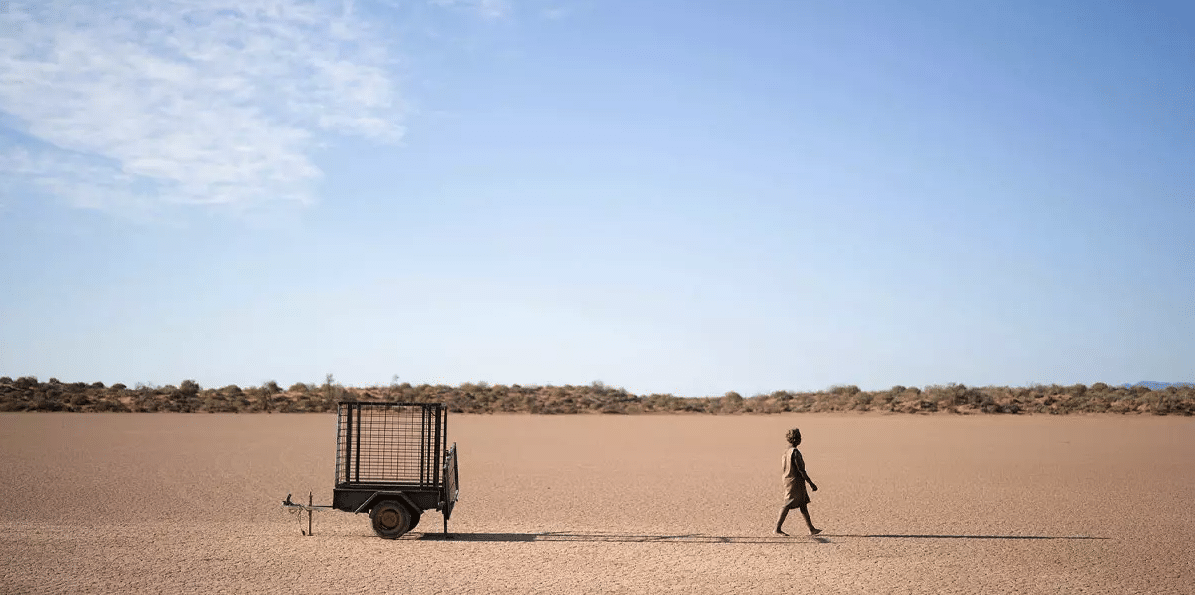When I clicked on the trailer for the new Australian film The Survival of Kindness, by the ‘visionary’ filmmaker Rolf de Heer, I was unprepared for the images I was confronted with.
A Black woman locked in a cage in a desert, trying to escape. Her face, hands and clothes covered in dirt. Her lips ashen. Her panicked, laboured breathing. As my mind desperately tried to understand what was happening to her and what had brought her to these circumstances, I noticed my own breathing was changing too. I was triggered.
The barrage of images in the trailer, some of which are much worse than what I’ve described, bring up my own pain and trauma from the racism I’ve faced over the 20 years I’ve lived in Australia. Honestly, I never thought I’d come across a film trailer like this in 2023. The two questions that immediately came to mind were:
- Why was a white, Dutch-Australian man telling this story?
- Why was the film being given rave reviews?
As per the film’s synopsis:
The Survival of Kindness uses allegory to analyse race and privilege, as it follows protagonist BlackWoman (South Australian Mwajemi Hussein), abandoned in a cage in the middle of the desert. Following her escape, she walks through pestilence and persecution, from desert to mountain to city, only to find more captivity.
The Survival of Kindness
The way the trailer portrays Black women as slaves is exploitative. While slavery is a historical fact, it has to be handled with considerable care because of the justified sensitivity of the audience. The images in the trailer alone suggest that no such care was taken in this depiction. It is exploitative because it objectifies Black and Brown people, even going as far as making the characters nameless – they are simply BlackWoman, Brown Boy and Brown Girl. The refusal to name them is dehumanising. Imagine a child being born and not named but identified simply by their skin colour.
This brings me to the use of a cage. Why is a human locked in a cage? On top of all of that, lead actor Mwajemi Hussein’s character cannot speak, which reminds me of all the times my opinions and ideas were ignored simply because they were coming from me, a Black woman. I think there are ways to discuss racism in film, but these do not, and should not, be detrimental to the people who continue to experience racism to this day.
Why tell these stories?
In a recent interview with the Hollywood Reporter, the film’s writer/director Rolf de Heer was asked why he, as a white Australian born in the Netherlands, feels compelled to tell these stories?
He failed to provide a clear answer. But something he did say stuck with me: ‘As long as I keep the budget at a reasonable level, I’ve had the freedom to make what I want. I feel like the most privileged of filmmakers, probably in the world.’
The problem with this is, when it comes to portraying different races these days, you can’t just do what you want. In a post BLM era, Bla(c)k people finally have more of a voice and understandably want to have more agency over how they’re portrayed.
De Heer’s statement also highlights a glaring issue in the screen industry: the privilege of having access to funds to make such a film when there are Bla(c)k and POC filmmakers who struggle to get their projects funded or produced even though they are telling their own stories.
It also highlights the lack of awareness from the gatekeepers to realise the issues with the film. Who were the people critiquing the film? Who were the people approving it for screening at a festival? Is there diversity in the board of these festivals?
If you are going to write a script and put a Black woman in the lead role, there are so many complexities that a white man may not understand. And what was more concerning was De Heer opted to cast a Black woman (Mwajemi Hussein) with no background in the film industry. While I support opportunities for Black women to lead in film and television roles, Hussein may not have been aware of the wider problems that come with the portrayal of Black women in the Australian media. Did the director have consultations with a Black woman or women who better understand these issues?
On casting Hussein in the lead role, De Heer said: ‘[Djinba man] Peter Djigirr couldn’t do it, so I had to find someone else. While trying to find someone, I came across this Ethiopian woman who was working in a place in a refugee centre. Speaking to them, I said: “I want some bloke, just like this woman.” And I thought: “well, why not this woman?”
‘But when I asked her, she said no. She had come out of a very traumatic place, and was very happy to have been accepted as a refugee into Australia.
‘She didn’t want anything to change. But both for me and my co-producer Julie [Byrne] after thinking of the role as a woman, we couldn’t go back. Without changing the script at all, the film became really interesting. We worked with a casting director and found Mwajemi [Hussein], who also came to Australia as a refugee from Democratic Republic of the Congo and now is a social worker.’
So De Heer and Byrne essentially found someone who’d been through traumatic events related to the subject matter of his film and made them relive it.
‘Trauma porn’
In an interview with Mwajemi Hussein for the Guardian, journalist Cath Clarke wrote: ‘Hussein has lived through her fair share of trauma. You could make a dozen films about her life.’
What is the obsession with using someone’s trauma to make a film?
In a 2021 article for Black Public Media, Leslie Fields-Cruz describes trauma porn as ‘media stories depicting the inhumane and often exploitative treatment of BIPOC individuals by police and/or White civilians … Trauma porn is a recurring element of Extractive Storytelling. The media’s excuse for distributing such graphic images is that it “raises public awareness” But for those at the centre of these stories, the footage is nothing short of the digital embalming of their most agonising and humiliating moments.’
I can’t understand how people could revel in our pain and trauma. Perhaps the audience that De Heer was targeting have become desensitised to our pain because narratives like this keep being told, over and over again.
We can’t change the past but we can use it to educate ourselves in order to create a better present and future, and perhaps that history should be taught and learned in a way that is safe for those whose experiences are closely tied to those traumatic events.
De Heer references the Black Lives Matter movement when discussing how he came up with the idea for the film with the Hollywood reporter. But my question to him is, if Black lives really mattered to you, then why did you create a film that could cause Black people more pain and trauma?
Perhaps it’s time you hand the storytelling power back to those that own the story.
Find out more about Norah Masige’s petition to boycott The Survival of Kindness.
The Survival of Kindness premiered at the 73rd Berlin International Film Festival on 17 February and will open the Screenwave International Film Festival on 20 April 20. It will be released in cinemas around Australia later in 2023.





